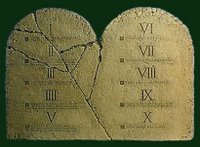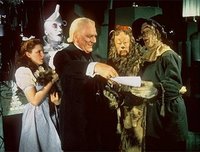That’s kinda like that question, “stopped beating your wife yet?” [
Well, have you?]
Ever look closely at the third commandment? Do you know what it is? “You shall not take the name of the LORD you God in vain, for the LORD will not leave him unpunished who takes His name in vain.”
The use of language and the abuse of God’s name is only a small part of what the commandment is about. A deeper understanding would be found in this example: if I worked at McDonalds, I am expected to wear the uniform that represents my association and role within that organization. This means I should not appear behind the counter at Burger King in my McDonald’s uniform. I would be taking the name of McDonald’s in vain.
Another example would be that of marriage. When a man and woman marry, she takes his name upon herself, thus being identified in union with that man. If she misrepresents him, she is taking that name in vain.
Ambassadorship is another concept that models this well. An ambassador represents the highest authority between governments, though the ambassador is not the authority himself. He merely represents his country and everything about it. To simply abuse or misrepresent is to take all he represents, the name in effect, in vain.
When one becomes a Christian, he is taking the name of God upon himself. He is God’s representative, wearing His name, under His banner of Love, wearing the clean clothes of His righteousness underneath His armor. Misrepresenting God is strongly not encouraged.
1 Samuel 13-15 contains a strong example of this very commandment being carried out. Saul is God’s representative, not merely the fist king of Israel, but also one of the last judges. People are breaking out of the cycle of doing what is right in their own eyes, so to that end, the judge-ship is working; however, the Philistine problem still remains. Deliverance from that oppression is one of the acts of the judges, climaxed in Samson, completed in David.
We read Saul was 40 when he began his reign and remained king until the age of 72 (1 Sam. 13:1). But how well did he represent God? Take it further: what does God expect of those who wear His name, represent Him? First we must consider what God is: Holy. Second, we must consider what God expects of believers: holiness. He is the standard of being. Interestingly, no other attribute serves as the standard. The scripture does not “Be omnipotent because God is omnipotent” or “be transcendent because God is transcendent”. These things are impossible because these are attributes He does not share. “it is written, ‘Be Holy because I am Holy.” (Lev. 11:44ff; 19:2; 20:7; 1 Pe 1:15-16).
But what happens when the believer lives in a tolerant society? What does the Christian do when he is surrounded with foundationless or shallow morals and is able to pick and choose which standards he will live by? Is partial obedience permissible? Is it even possible? Possible, YES; Permissible, NO. As I’ve said a long time ago: man does the impossible.
When one tolerates sin, does he downplay righteousness or unrighteousness? The bottom line is found in the first phrase: he tolerates what God cannot. Since God is Holy, he is uplifting that which cannot exist in God’s presence. He is breaking the first commandment, “You shall have no other god before Me.” He is breaking the second commandment, “You shall not make for yourself an idol”. He is breaking the third commandment, “You shall not take the name of the LORD your God in vain.”

When one downplays righteousness I personally wonder if the person is really saved. If he is saved, he would exalt righteousness. To play with the standard is to flirt with disaster.
The people of God should uphold the high standard of purity and faithfulness. Saul found himself standing in the middle: God on one side, the people on the other. Two kinds of people, namely: friends and enemies. While the Philistines were pressing in on one side, God’s chosen people had to be ruled on the other. Saul felt he had an image to uphold and overstepped the righteousness of God. Samuel, on the other hand, kept Saul’s feet to the fire. While it seemed that Samuel was always one step behind Saul, Samuel was actually after what God was after: a man after God’s heart. Each time Saul moved, Samuel was there to point out the wrong move. Saul would make a decision for man and country and Samuel was there with, “But God . . .”
Take for example Saul’s rationale for offering the sacrifice and not wait for Samuel (1 Sam 13). Saul’s reasons were:
- The people are scattering from me;
- You did not come within the appointed period of days;
- Philistines are gathered at Michmash.
Saul’s reasons were an exercise in blame-shifting. His actions were inexcuseable, nor understandable because they were self-serving, not God-serving. He says, “I says to myself, ‘The Philistines are coming and I don’t have God’s favor yet!’ so I overstepped what I knew to be right and took matters into my own hands.”
Samuel’s response was perfect: “You have acted foolishly: you have not kept the commandment of the LORD your God.”
Did Saul love God? I am sure he did. But he did not strive to keep His commandments.
Jonathan, on the other hand, is worth consideration here. Saul could not quite get the upper hand against the Philistines. On one hand, Jonathan stands in comparison with his father with that streak of hardheadedness; On the other hand, in contrast to his father, Jonathan was stubborn to do what was right. His father was stubborn to do as he wished. We read of the fact that the Philistines outlawed blacksmithing, so no sword was found Israel. Was Saul a pushover? To a degree, I think so. But, 13:22 makes it plain that Saul and Jonathan had swords while the people did not. I imagine Saul’s sword was more symbolic of his office, yet still a real sword. Jonathan actually used his. This is why he was able to win victory over the Philistines. While his dad sat under the pomegranate tree, the red juice running off his elbows, Jonathan was out harvesting heads, blood dripping from his sword.
I like Spurgeon’s words here: “We are engaged in a great war with the Philistines of evil. Every weapon within our reach must be used. Preaching, teaching, praying, giving, all must be brought into action, and talents which have been thought too mean for service must now be employed. . . . most of our tools need sharpening, so make the Philistines sharpen our weapons.” Simply put, we have no reason to lay down our arms at the feet of evil and leave them there!
Here’s a question to consider: would Saul be a good candidate for overseer according to 1 Timothy 3:1-13? Would you vote Saul into office? If not, then why on earth did God choose this guy to be king? Before you get all worked up, consider Solomon, a not-much-nicer guy for the office—but there was one thing Solomon got that Saul didn’t. Wisdom.

Here’s another question: is the Holy Standard an impossible attainment? Does anyone really meet the qualifications of 1 Timothy 3:1-13? The answer to both is, “yes.”
God chose Saul because God chose Saul. Saul did not turn out to be the man that kept the standard—it’s that wonderful tension of Sovereignty vs. Free Will—we won’t understand it but it is all worked out in the mind of God. They key feature here is to note that at one point in his life, Saul obeyed the commandments of God and was filled with the Holy Spirit. The day he stopped obeying was the day he overstepped God’s commands and lived by his own rules. The spirit that stayed with him was one of trouble and unrest.
What happened to the awe and respect God deserves? It gets covered, but it cannot cover completely. Unrighteousness gets elevated and tries to eclipse the brightness of God’s righteousness. Think about it. The moon is a tiny thing in relation to the sun. The only reason the moon is able to cover the sun is because of the angle of perception—the moon can never cover the sun. When the eclipse happens, the entirety of the sun is not blocked out—it’s rays still shoot out over the moon’s horizon. It’s like that little game we used to play as kids: you look across the room at the teacher and hold your fingers up in front of your eye until the fingertips “squeeze” the teachers head. You really can’t do it, but the off perception makes it seem so.
The character of God never changes and remains the standard. This is why His dealing with the Amalekites was not harsh—God had HIS reason for dealing with them in that way. God was using Israel as His instrument to pour out wrath on the Amalekites. Saul was basically standing up and saw profit in extending a little “grace.” The Amalekites were unchanged (those that survived) and Saul was worsened by trying to alter the standard.
How much sin is tolerable in our lives? How much should we allow to remain?
What should we do about our brothers and sisters who hang onto sin? We DO something about it, so . . .
Stopped taking God’s name in vain yet?


 When one downplays righteousness I personally wonder if the person is really saved. If he is saved, he would exalt righteousness. To play with the standard is to flirt with disaster.
When one downplays righteousness I personally wonder if the person is really saved. If he is saved, he would exalt righteousness. To play with the standard is to flirt with disaster.